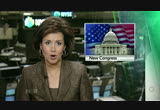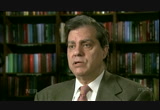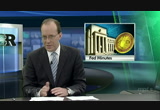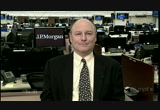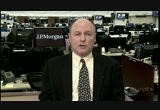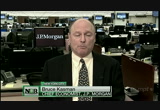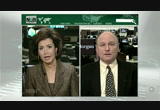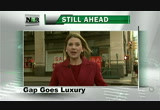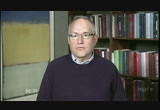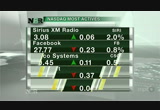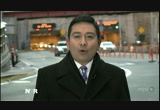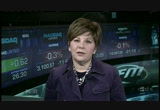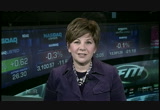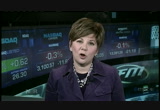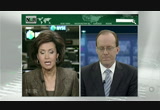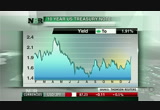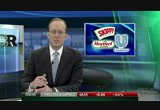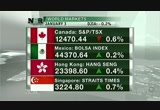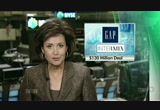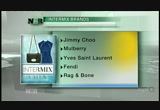tv CBS Evening News With Scott Pelley CBS January 3, 2013 7:00pm-7:30pm EST
7:00 pm
captioning sponsored by wpbt >> this is n.b.r. >> susie: good evening everyone. i'm susie gharib. the new congress is sworn in and john boehner keeps his job as house speaker. coming up, a 2013 legislative preview. >> tom: i'm tom hudson, auto sales end 2012 with their best sales year since the great recession, helping drive the u.s. economic recovery. >> susie: and a win for google. the web's 800 pound gorilla is cleared of anti-trust charges when it comes to its online search business. >> tom: that and more tonight on "n.b.r."! >> susie: congress is back to work in washington, after a one day break. new members of the 113th congress were sworn in today, including 100 freshmen. they face huge challenges: fights over the sequester and the debt ceiling coming around march first.
7:01 pm
and as sylvia hall reports, there are low expectations lawmakers can get the job done peacefully. >> reporter: returning lawmakers didn't get much of a break after that bruising fiscal cliff battle. they're back in washington today, swearing in the new congress. demographically, it's the most diverse group ever sworn in. but politically, this congress is expected to deliver the same gridlock as the last one. >> the problem is that the congress is very divided, not only are the two houses divided, but each party is further away from the middle than has been in the past, and the public- the american public itself, is very divided. >> reporter: they'll start the year by tackling some big issues left over from last session. first in the house, a bill to help victims of superstorm sandy. house speaker john boehner nixed the vote in the last hours of 2012, drawing a firestorm of criticism. it comes up in the house in two parts- the first tomorrow, and the other mid-january.
7:02 pm
>> the next act will begin a couple of months from now probably in late february, early march, when we hit the debt ceiling and when the automatic spending cuts come into play again and either have to be replaced with other spending cuts, or again, kicked down the road. >> reporter: these are the same issues that snarled congress in the summer of 2011, and again during the fiscal cliff debate. there's little hope for a better outcome this year. president obama has promised not to negotiate with the new congress on raising the debt ceiling, but republicans are ready to use it to force major federal spending reforms and tame the national debt. right now, the u.s. owes $16 trillion, but some calculate our total liabilities much higher. and as congress jumps from small deal to small deal as they have been, analysts worry big problems are just getting bigger. >> $60 trillion is a conservative estimate of our unfunded liabilities of medicare social security, and medicaid put together.
7:03 pm
that's scary. that's scary. and, the fact of the problem of $2 trillion solutions to $60 $2 trillion solutions to $60 trillion problems, you see the occasion of the lack of problem and resolve of the political class here in washington. >> reporter: some also worry the down-to-the-wire theatrics of these fiscal debates in washington will overshadow other issues that need to be addressed, like education and immigration reform. issues that could be held hostage until the spending fights are over. sylvia hall, "n.b.r.," washington. >> tom: other changes could soon be in store for washington: treasury secretary timothy geithner will leave the administration before the end of the month according to sources talking with bloomberg. that would mean geithner would leave as president obama and congress continue negotiating raising the nation's debt ceiling. geithner is the only remaining original member of president obama's economic team. the federal reserve is looking to end its bond buying programs this year, but there's no agreement as to when. minutes of the central bank's december meeting released today, show division among policymakers about when to stop the strategy. the federal reserve has been buying $85 billion worth of
7:04 pm
government mortgage-backed bonds per month in its effort to drive down long term interest rates. some on the fed want to stop, "well before the end of 2013." that sent stocks lower, the dow closed down 21 points, the nasdaq lost almost 12, and the s&p fell three points. >> susie: jobs were also a big topic for investors today. american companies stepped up hiring in december according to a private payrolls report. a.d.p. says 215,000 jobs were added to private payrolls last month, it also revised its november numbers higher. tomorrow we'll get a more complete picture of the job market when the government releases the december employment report. joining us now with a preview, bruce kasman, chief economist at j.p. morgan. so, bruce you're forecasting 200,000 new jobs were created in the month of december that is higher than other consensus estimates.
7:05 pm
how would you describe the job market right now? >> i think it's solid and getting a little bit stronger as we move to year end. our forecast for december does have some lift as some of the damage to the labor market caused by hurricane sandy goes away. but i do think we're running a pretty solid underlying trend here somewhere, 167-- 165,000 t has moved up the middle part of the year. businesses were cautious in the middle part of the year, they look like they are breathing a sigh of relief towards the send end of 2012. >> i have talked to a lot of c.e.o.s over the last couple of weeks granted some of it was during the fiscal cliff crisis and they were saying they don't have plans to hire for this year. so what impact is that going to have on hiring for the new year? >> well i think there is still an underlying level of caution in terms of corporate america. but i think the concern earlier this year that were associated with blowing profit growth fears about europe china and the u.s.
7:06 pm
political scene did cause a step back. and i think what we're seeing is that profits continue to grow. the consumer continues to spend. and corporates are doing some what better here in that context. it's not a boomy environment but it's an environment in which things have gotten some what better. and probably will stay on a solid pace as we go into the new year. >> well, we talk about consumer spending. we have had some good economic reports recently. we're going to talk a little later in the program about good december auto sales am we've also had some decent retail sales. what do you see as the appetite for consumers to spend and for businesses to spend in the coming year? >> well, i think the consumer has held up well. it's one of the reasons why businesses are feeling a little bit better. i think as we go into the new year we have a plus coming as inflation is moving lower boosting purchasing power but there is a big negative. as the tax increases come as the payroll tax expires consumers are going to have
7:07 pm
a hard time. i think we believe the economy slows early in the year on the back of a slowing consumer spending due to fiscal tightening. >> how much growth do you see for 2013. and also on the job scene where do you see the unemployment rate by the end of the year? >> well we're looking for growth to be a little bit above 2% on the quarterly average. but the year to start quite slow a little less than 1.5% as we absorb the tax increase, deal with some of the lingering uncertainties about what is happening in washington. we're right and we do absorb this the global economy gets better we think growth could be up toward --% as we move through the second haft of year. there su a very mixed year way slow start but a stronger end. >> susie: you know, getting back to the washington battle, you heard sylvia hall's report at the top of the program, to what extent will those budget battles impact the psychology of consumers and c.e.o.s and what impact will they have on the economy at the end of
7:08 pm
the day? >> well, i think if we can avoid the debt ceiling crisis spilling out, i think the effects from confidence will be limited. i think the big story really has come avoiding the bush tax cuts from going away, having more permanence in terms of the tax structure and also i think avoiding some of the real big potential damages happening globally. we do have a big tax increase early in the year but i think if we don't really hit the debt ceiling problem, i don't think it will have a big effect on macro performance this year. >> all right. encouraging to hear the vps will be okay. thankses a lot bruce kasman chief economist at jpmorgan. >> reporter: i'm erika miller in new york. gap announced the purchase of women's luxury boutique chain intermix, still ahead, we'll look at how that acquisition could help the mass-market retailer. >> tom: the federal trade
7:09 pm
commission today wrapped up a nearly two year investigation into how google does business. google agreed to two settlements, one over patent licensing, the other gives advertisers more flexibility over their online campaigns. but, in a big win for the search giant, the agency, said google does not favor its own products and services in its internet search results. after 20 months of digging into google's business practices, looking at everything from search to cell phones, and sifting through more than nine million pages of documents collected from google and competitors, the nation's anti- trust watchdog agreed with google, that when it comes to search, google follows its pledge "to do no evil." >> i think today's decisions show that in order for there to be antitrust enforcement you have to have clear evidence that consumers are harmed, and while there was certainly a threat of consumer harm on this patent issue, there was no consumer harm on the search related issues. >> reporter: today's settlements ends all of the f.t.c.'s competition related investigations into google. the company agreed to grant fair
7:10 pm
and reasonable patent licenses to its competitors in the cell phone industry. while it's u.s. troubles are over, google still faces heat from regulators in europe: >> if there's no evidence that google engaged in search bias in the united states, it seems to me entirely unlikely that there could be that kind of evidence in the e.u. so i think we're going to see a very similar result in europe. >> reporter: still, another issue has popped up to plague the search giant, the state department today called a planned humanitarian visit to north korea by google executive chairman eric schmidt, "not helpful." and stressed he's traveling as a private citizen, not a representative of the u.s. government.
7:11 pm
>> susie: the auto industry closed out 2012 with a bang, marking its best year since 2005. december sales of cars and trucks were better than expected, and 2013 looks to be another banner year for the industry. ruben ramirez reports. >> reporter: worries about the fiscal cliff weren't enough to keep buyers out of car dealerships last month. people were buying a lot of cars and trucks. >> there gets to be that certain point where buying that used car or even leasing a new a new one or even just outright buying a new one, it's really not that much more to buy a new vehicle and you can get that joy of that new car smell. >> reporter: helping auto sales last year is that the average age of cars on the road is now around 11 years old. superstorm sandy specifically helped boost december's numbers, credit suisse estimates the storm may have added about
7:12 pm
50000 sales in the northeast last month. general motor sales rose nearly 5%. ford sales were up more than 1.5%. its relaunched lincoln brand is struggling to gain traction. >> sales for lincoln will continue to look week for a few more months at least and if we don't start to see them turnaround at the midpoint of 2013 then there will be more cause for concern. >> reporter: chrysler sales surged 10% in december, much of that strength came from a big jump in ram pickup sales. toyota posted some healthy numbers as well, up 9% in december. >> i think they're feeling the effects two fold, pent up demand from their sales and also the increased demand for their new products. >> reporter: toyota's resurgence will likely continue this year, but the biggest winner will likely be honda with new models of its accord and civic. while 2013 may turn out brighter for asian automakers, u.s. automakers will likely also benefit.
7:13 pm
>> when you get more consumers into showrooms they are going to crossshop. if g.m. has a new product, it can bring out consumers to cross shop with say a ford f150 or a ram pickup and in turn you get people in both the new and used market and that's good for everybody. >> reporter: most industry watchers expect u.s. sales for 2013 to come in above 15 million cars and trucks. that continues a healthy recovery, for an industry that saw annual sales dip to just above 10 million units during the financial crisis. ruben ramirez, "n.b.r.," new york. >> rebecca lindland says her outlook for cars this year is conservativement she's the director of research at ihs automotive. so rebecca, why the cautious outlook? is it because american consumers will be paying higher taxes this year? >> it really is susie. we are looking at sales of about 15 million units for light vehicle sales. for 2013 and the reason that that is pretty cautious is because we see consumers facing higher tax bills and
7:14 pm
continued uncertainty as we deal with the ongoing budget crisis. >> but for people who are in the market to buy a car will they be buying american. it's been amazing to see how strong sales of u.s. automakers have been over the last 12 months. do you see that continuing? >> we do see continued strength from gm, ford and chrysler. you know they went through some really bad times the last couple of years but all that restructuring has resulted in really well-run companies with exciting new products coming out. so there's a lot of opportunity for growth when we look at the big three. >> and they're expect wift toyotas and the hondas? >> they are very competitive with their japanese counterparts. even hyundai and i cana from korea the big three there is nothing to apologize any more in their product line-ups at all. they really have done a terrific job. there's a lot of dealer
7:15 pm
restructuring going on. just a lot of excitement in detroit as the industry comes back. >> susie: let's talk a little2bkt about other trends. the detroit auto show is opening week after next. i know you will be there. what is going to be the big theme there? >> well it's really interesting when i'm looking at the products coming out. the last two years has been such a concentration on small cars because we really didn't have a lot of small cars in the u.s. so we saw a huge number of new models being introduced. but now it's time for the big pickup trucks to come back. we're seeing full size pickup trucks coming back. they haven't been redesigned for a long time so we've got gm coming out with their chevy silverado and g m.c. sierras. we've also got ford coming out with their f-150 pickup truck later on in the year. so it's a little bit of a surprise but consumers are really going to see some redesigned full size pickup trucks this year. >> that is a surprise. tell us about the outlook for hybrids and electronics. are these getting to be
7:16 pm
popular with consumers are or they going for the big cars still? >> well they're going for vehicles that they want to buy. but they're going for fuel efficient version so consumers are buying four cylinder engines or six cylinder engines. we're seeing them buy more fuel efficient versions of cars they already want to buy. with that being said hybrid sales are doing okay. we're looking at about 3.2 to 3.5% of all the vehicles sold are hybrids. at he not nearly as much as we could have because there is a lot of new models coming out. but the toyota prius line-up in particular has done incredibly well this year. electric cars, the jury is still very much out. we have government mandates that say that manufacturers have to make these vehicles but we really need to increase consumer awareness and education when we look at getting more consumers into electric vehicles. >> all right well a lot of choices out there for
7:17 pm
consumers. for those interested in buying. rebecca, thank you so much. great having you with us, rebecca lindland of ihs automotive >> susie: more closure today on that massive b.p. oil spill. transocean agreed today to pay fines and penalties of $1.4 billion to settle criminal and civil charges related to its role in the explosion. tom that was almost three years ago, and $1.4 billion sounds like a big fine, but b.p., the
7:18 pm
owner of the well paid a lot more: almost $5 billion to settle all criminal and civil charges. slowly the story financially is coming to an end for the companies involved in this. investors breathed a bit of a sigh of relief with transocean shares rallying pretty decently today in otherwise analysists markets, up.3, 5% 49.20 a share although the stock was close to 90 a share before that oil spill almost three years ago. otherwise in market focus here today here today >> tom: stocks see-sawed between losses and gains, digesting yesterday's sharp rally. the session began with some selling pressure but that gave way to small gains by mid-day. however, a wave of selling hit at 2 p.m. eastern time, when the federal reserve released those minutes of its december meeting. as we mentioned earlier the notes indicated it's latest bond buying program to push interest
7:19 pm
rates down, would end sometime this year. the s&p 500 ended lower by 0.2%. trading volume slowed from yesterday's pace. 705 million shares on the big board. just under 1.8 billion traded on the nasdaq. the information technology and material sectors were the biggest drags on the market, slipping 0.7%. with the federal reserve acknowledging it wants to stop its bond buying strategy before the end of the year, we saw a third consecutive day of selling in the bond market. yields on the 10 year government note jumped to 1.9%. this is the highest yield, lowest price since may third. the 10 year bond interest rate was at 1.7% on new year's eve, that was monday. with the tax portion of the fiscal cliff addressed, and now the federal reserve looking to end its quantitative easing this year, yields have jumped as bonds have sold off. it is worries about insurance premiums not keeping pace with high medical costs this year that hit shares of united health
7:20 pm
care. the stock fell 4.7% as volume almost tripled. this is its lowest price since mid-november. investment bank deutsche bank downgraded its rating of the managed health insurance sector, including united health care to neutral. the analyst pointed to more competition for customers holding down premium price increases. retail stocks were in focus with many of them reporting december sales. we'll have more on that in a moment, but two very different retailers had very different updates on their financial outlooks. deep discount store family dollar cut its outlook after a disappointing quarterly profit. shares fell 13%, dropping to a 10 month low. teen apparel store hot topic jumped 11.1% to a new 52 week high. hott topic predicted its earnings growth this year to be twice what wall street analysts had expected. just what spiced ham needs, peanut butter. spam maker hormel foods is buying the skippy peanut butter business from unilever. hormel is paying $700 million for skippy. the deal continues hormel's expansion beyond its meat
7:21 pm
business, which includes spam and the jennie-o turkey store brands. investors like the recipe hormel shares rallied 3.7%. volume more than tripled with shares breaking out to an all- time high. the deal will add to earnings this year. hormel also gets faster international growth. skippy is the top selling peanut butter in china. unilever shares fell modestly down 0.8%, but it remains less than a dollar off its most recent high. all of the five most actively traded exchange traded products were lower. the emerging markets fund led the losers, down 0.7%. and that's tonight's "market focus."
7:22 pm
>> susie: it ended up being a merry christmas after all for the nation's retailers. a number of chains reported today better than expected december sales. according to research firm "retail metrics", excluding drug stores, sales rose 4.8%. that's much higher than the 3.4% expected. costco was a big gainer, with sales surging 9%. nordstrom did nearly as well, followed by discounter t.j.x. sales at the gap were also better than expected: up 5%. but there was an even bigger surprise from gap today. it's buying luxury chain "intermix" for $130 million dollars. now intermix and its 38 stores, will become part of gap's portfolio of brands, which include banana republic and old navy. does this latest acquisition make sense for gap? erika miller reports. >> reporter: at first it may seem strange that gap bought a chain selling designer clothing for women. until you realize that one of
7:23 pm
major reasons gap is struggling is lack of a fashion edge. remember the '90s? gap was a megabrand, defining fashion with its khakis, denim tees and button down shirts. but as the millennium turned, so did gap's u.s. sales. the retailer has steadily lost ground to rivals like h&m and zara. >> the fast fashion retailers have really markedly changed the face of fashion as we know it. kids, teens, adults no longer want to wear an identifiable uniform. you are not going to see as many logo-driven items any more. >> reporter: in the past year, gap has made some bold changes, shaking up its management team and putting more emphasis on fashion. that's where intermix comes in. the chain sells designer labels like jimmy choo, mulberry, yves saint laurent, fendi, and rag and bone. analyst oliver chen, whose firm does business with gap, thinks the deal is a win-win for both firms: >> i think intermix brings a lot of fashion credibility to the gap.
7:24 pm
also the gap brings cash flow and capital to intermix. intermix can probably have a very successful online business. >> the acquisition comes as gap plans to close more than 20% of its namesake north american stores. like many retailers, gap is looking overseas for growth. >> reporter: gap also plans to also expand intermix abroad, presumably to luxury-obsessed markets like china. gap has plenty of experience with acquisitions, it bought women's athletic apparel retailer athleta in 2008, but analysts do see some risks to the intermix deal. >> we'll have to watch intermix to make sure it stays special. intermix is joining a big billion dollar, and it is a $100 million retailer with entrepreneurial roots, and relationships with these special designers. >> reporter: he's keeping his neutral rating on gap shares which are up an impressive 75% in the past year. now gap is waiting for its fashion turnaround to have the
7:25 pm
same success. erika miller, "n.b.r.," new york. >> tom: tomorrow on n.b.r. we head to florida's citrus groves, to find out what's behind an expected drop during the orange harvest. we'll talk to the c.e.o. of smoothie and juice chain jamba juice. and our friday "market monitor," kate warne of edward jones expects solid corporate earnings this year. we will hear how that plays into her investment strategy. test test. starbucks is also bidding for some of tully's assets. dempsey says buying the coffee chain is all about saving jobs. a judge will decide who get's tully's next friday. >> how much you wajted to
7:26 pm
bet if they get it will you see a lot of product placement on that abc show. >> tom: more than a cup of coffee is what it will be worth. that's "nightly business report" for thursday, january 3. have a great evening everyone and you too susie. >> susie: goodnight tom. thanks for watching everyone. we'll see you online at: www.nbr.com and back here tomorrow night. captioning sponsored by wpbt captioned by media access group at wgbh access.wgbh.org
82 Views
IN COLLECTIONS
WJZ (CBS) Television Archive
Television Archive  Television Archive News Search Service
Television Archive News Search Service 
Uploaded by TV Archive on

 Live Music Archive
Live Music Archive Librivox Free Audio
Librivox Free Audio Metropolitan Museum
Metropolitan Museum Cleveland Museum of Art
Cleveland Museum of Art Internet Arcade
Internet Arcade Console Living Room
Console Living Room Books to Borrow
Books to Borrow Open Library
Open Library TV News
TV News Understanding 9/11
Understanding 9/11
